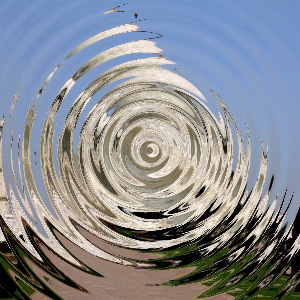| 5.15. Vlny | ||
|---|---|---|

|
5. Filtry zkreslení |  |
Obrázek 17.95. Example for the Waves filter

Original image

Filter „Waves“ applied with default options and period = 20.0
Tento filtr vytváří stejný efekt, jako kámen hozený do rybníka, příčemž hladinou rybníka je v tomto případě aktivní vrstva či výběr. Vytváří koncentrické vlny.
![[Poznámka]](images/note.png)
|
Poznámka |
|---|---|
|
These options are described in 2 – „Common Features“. |
Move the center of the waves
Varies the height of the waves.
That is wavelength. Varies the distance between the top of waves.
The high default value suits large images. For images of some hundreds pixels wide and high, a lower value, such as 20 in our example, fits better.
This command shifts the top of the ripple.
Values less than 1.00 render waves oval, with major axis vertical. Values higher than 1.00 give a major axis horizontal.
These interpolation methods are described in Cubic (sometimes called „Bicubic“): The color of each pixel is computed as the average color of the eight closest pixels in the original image. This usually gives the best result, but it naturally takes more time..
This limits the deformation in the image area. When this is disabled you seem to get transparent or black areas (depending on whether the layer has an alpha channel or not). When enabled, these areas will keep their normal color.